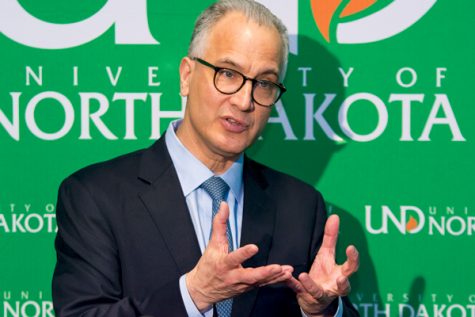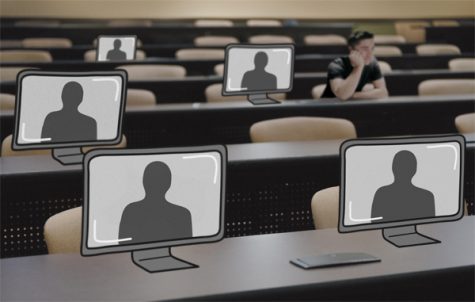The rise of Amway on campus
September 4, 2017
“You could tell it was a pyramid scheme the second they started talking,” Steven Gabel, a junior at UND, said about the Amway presentation he was invited to by a friend last year.
This is the impression that many students have upon hearing about or attending presentations regarding the direct selling company Amway. In recent years, the company has seemed to make so much headway in the Grand Forks area that one would be loath to find a student that hadn’t been invited to a presentation, known a friend who sold for the company, or at least heard of the name.
The nature of the business, in that it depends upon interpersonal relationships and conversations in order to sell products and gain employees, makes it ripe for development on a college campus. It also makes it difficult for students who have never previously heard of
Amway or other direct sales companies to understand what it makes them different from a “typical” job.
People are recruited into Amway by signing up to be a representative under an existing representative, who may be a friend, relative or acquaintance. They then sell Amway products such as vitamins, energy drinks and cleaning supplies to people they know and recruit other people to sell products in order to earn commission not only from their own sales, but also from the sales of those underneath them.
Of the students the Dakota Student spoke to about their experiences with Amway, none of them had been told explicitly that they were being invited to an Amway presentation, simply that they were being presented with an opportunity to earn money. This may be why many feel as though they are being duped by, as Gabel put it, a “pyramid scheme.”
It is important to clarify that Amway is not, legally speaking, a pyramid scheme. In fact, it was the legal case Federal Trade Commission (FTC) v. Amway in 1979 that refined the federal government’s definition of an illegal pyramid scheme after it was established that pyramid schemes were illegal in a 1975 case against the now-defunct company Koscot Interplanetary Inc.
In a 1998 FTC report on the topic of pyramid schemes, General Counsel Debra A. Valentine says that “Some schemes may purport to sell a product, but they often simply use the product to hide their pyramid structure. There are two tell-tale signs that a product is simply being used to disguise a pyramid scheme: inventory loading and a lack of retail sales.”
Amway does lack retail sales, but they do not require representatives to buy products before selling them to another party, which would leave the possibility of saddling representatives with stock they simply cannot sell.
Ty Doan, a sophomore at UND who started working for Amway last year, says that the only fee he has ever had to pay was a $250 “entrance fee” to buy a business kit. He says that if a person decides after 90 days that the company is not for them, they can get a refund, and that he does know a person who received a full refund for this fee.
“Some people confuse pyramid and Ponzi schemes with legitimate multilevel marketing. (…) MLM’s may pay commissions to a long string of distributors, but these commissions are paid for real retail sales, not for new recruits.” Valentine said in her report.
Of course, while one does not necessarily need to recruit others to generate income from a personal Amway business, it does help. “He didn’t sell things- he only sold Amway at that point” Gabel said about the representative who presided over his Amway presentation.
Although the company is easy to join, it appears to be difficult to maintain, particularly for college students. Doan himself is no longer qualified as “active” within Amway and “is not reaching out” to people he knows on a regular basis to become recruits or customers.
Doan said that he thinks you could be successful with the company “if you have some time and if you’re really outgoing” and that “the people who are doing really well work about 10-15 hours a week.”
Doan cited the time required to invest into the company as the biggest reason he has not been more successful with it. At the Amway presentation he attended, “they said it was a good part-time job,” and the presenter implied that if he were eventually successful enough with it, he would be able to quit his current job at a local grocery store Gabel said.
Gabel’s presentation was given by a man named Billy, who is also directly above Doan in his Amway “upline.” The Dakota Student was initially invited to an Aug. 29 Amway conference hosted by Billy at the Grand Forks Canad Inn but was later uninvited by an organizer. Billy could not be reached for comment.
Although it is an old company, Amway has seemed to appear from thin air at UND, becoming relevant on campus through a meteoritic rise of coffeehouse meetings made under false pretenses, abundant energy drink samples and gossip. It is easy to see why it has become popular with people in the college student demographic. It is very social, requiring a vast network of friends and acquaintances. It even provides a community of sorts by itself. His “upline would get together, go out for food and talk about how things were going” Doan said.
Amway is a completely legal company, and it is possible to make money from it if one is willing to put in the work. That much is true. Students thinking about becoming a representative must work it out for themselves, however, if they have the type of personality and drive it takes to be successful in this type of business, and if they personally agree with the philosophy of the business model.
Diane Newberry is the news editor of The Dakota Student. She can be reached at [email protected]









